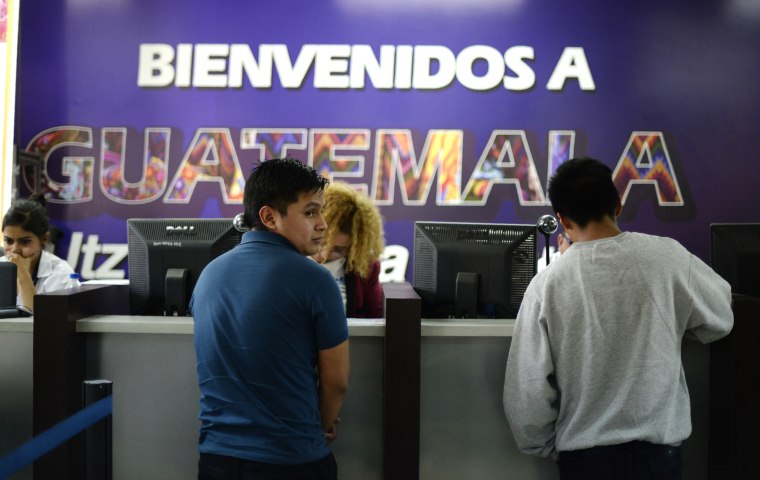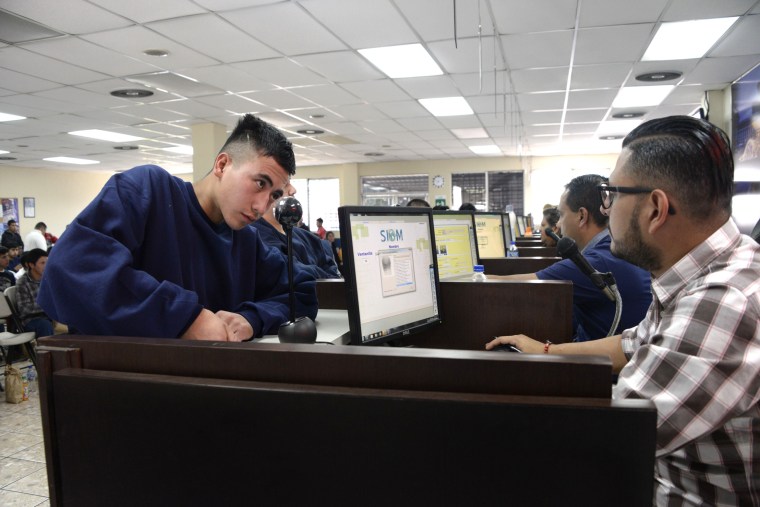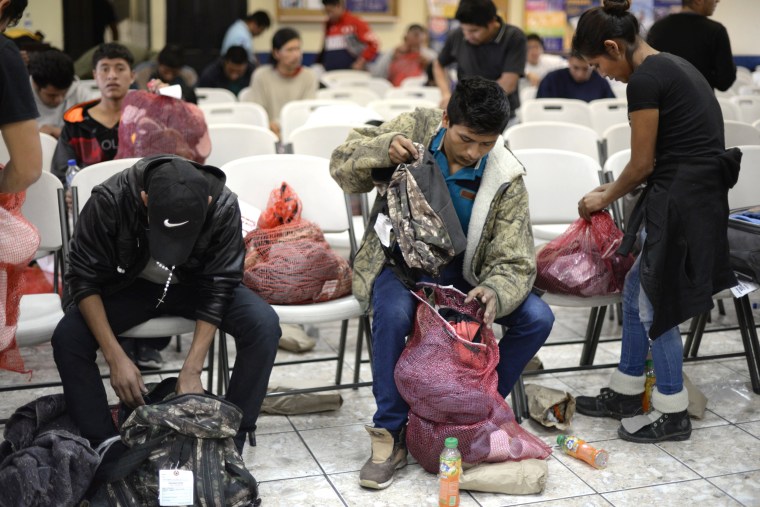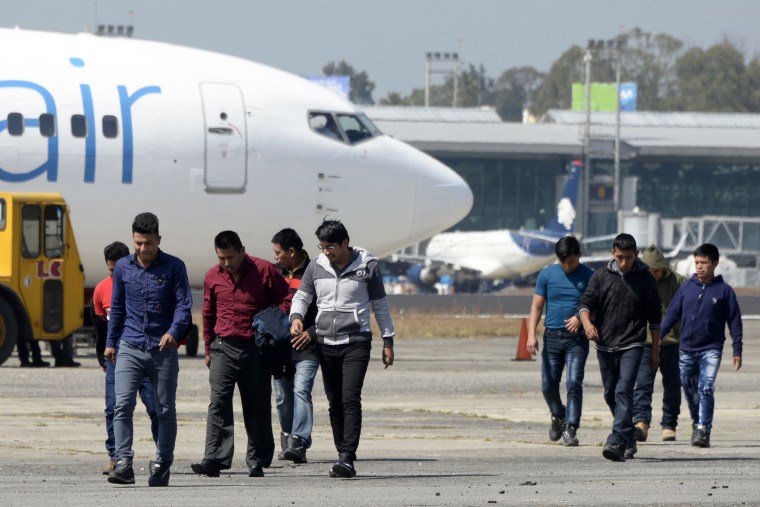GUATEMALA CITY — Outside a low, white stucco building operated by the Guatemalan Air Force, a few people wait for “el vuelo de los deportados” — the flight of the deportees. Each plane that lands brings 75 to 130 Guatemalans, in handcuffs, back to their home country after being deported from the U.S.
Since the end of 2017, the number of flights have been increasing, according to Carlos López, administrator of the migrant aid organization Casa del Migrante, based in Guatemala City.
"In recent months, there have been two or three flights every day," López said recently as he waited for a plane to land.
In January, nearly 1,000 more Guatemalans were deported by air than in the same month last year, at the end of the Obama administration, Guatemalan government statistics confirm.
When they land — handcuffs removed — the returned Guatemalans are ushered into a waiting area lined with plastic chairs where they find sandwiches and bottles of water. A government employee offers a few words of welcome and directs them to windows where their data will be recorded.
The deportees then exit double glass doors and take their first steps toward trying to rebuild their lives in this country of 14 million. For many, this won’t be easy.
Hicer Hernando, 23, of the province of Izabal, told NBC News that he decided to leave home after his father was killed in a machete attack motivated by religious differences with other townspeople. “Because we are Catholics, and they are Evangelical Christians … ” Hernando said. “They were going to kill me, too.”

Apprehended while trying to cross the border in Arizona, Hicer said that he wasn’t sure where he would be going next, but that he feared for his life if returned to Guatemala.
“It’s hard,” said Juan Sebastián Tuil Mejía, a volunteer with the Association of Returned Guatemalans, a two-year-old organization. “I was deported a year and a half ago, and I still can’t find a job.”
With flights increasing each week, volunteers like Tuil Mejía provide welcome services to deported migrants. They’ll offer phones for the returnees to contact their families, give them maps and help them find transportation back to their communities.
Beyond these gestures, the returnees are mostly on their own. “Jobs are hard to come by here. … Most people who hire want you to have an education; in the United States I was able to work without having a formal education,” said Tuil Mejía, who worked in construction and gardening in the Los Angeles area. He lived there over 30 years before being deported.
“It’s been really difficult,” he said. His wife and six children, aged 7 to 32, remain in California, he said, and although they speak often by phone or video, “to be away from them, that’s probably the most difficult thing.”
'There is nothing for us here'
Guatemala has a high rate of unemployment and underemployment. Only three of 10 Guatemalans have a formal job. In addition, almost half of the population is under 19, and experts estimate that 140,000 young people enter the labor market every year, but only two of 10 will find work in the formal sector.
“We went to try to complete our dreams,” Tuil Mejía said of why he went to the U.S. “When they send everybody back, they send them to … the same situation where they started. There is nothing for us here.”
In October 2009, the Guatemalan government approved funding for a new agency to “protect, support and provide assistance to Guatemalan migrants and their families.” The Consejo Nacional de Atención al Migrante en Guatemala, the National Council on Immigration, has put together a number of programs to help integrate returning Guatemalans into society. This includes a jobs database and the welcoming program for returnees.

The issue is how effective or up-to-date those programs are. Lisbeth Gramajo, an anthropologist at Rafael Landívar University who studies the reintegration process for returned migrants, said the government’s principal role in reintegrating deported Guatemalans is the welcoming service at the airport.
“After that, there is no follow-through to help the migrants in the process of reintegration,” she said.
The immigration council has been without a director for two years, with the selection process mired in politics and dependent on an ineffective Congress.
"We know that migrants in our countries have been hit by the lack of public policies of our governments,” said the Rev. Mauro Verzeletti, a Roman Catholic priest and the director of Casa del Migrante, one of the few organizations in the country that helps deported migrants.
"Corruption has really taken up a lot of space in these countries that are more and more controlled by drug traffickers and organized crime,” said Verzeletti, a priest in the Scalabrinian order, whose mission is to work on behalf of migrants. Until the situation changes drastically in Central America, Verzeletti said, tens of thousands of young people will continue to migrate north.
One Deportee's Story
In a country where over 60 percent of the population live below the poverty line, most Guatemalans, like Rodolfo Antonio Arias, 22, migrate for economic reasons. He spoke to NBC News soon after returning to his native country on “the flight of the deportees.”
Arias had borrowed 80,000 quetzales — almost $11,000 — to enter the U.S. after drought ruined his family’s agricultural fields. His father had optimistically taken out another loan to expand the family’s planting fields, but then the harvest dried up. Such droughts, attributed to climate change, are affecting large portions of Guatemala.
Now Arias finds himself back home and in debt. The only avenue he sees to get out of his and his family’s financial crisis is to try to move north again.

"We lost a lot,” he said. "Maybe this time they won’t throw me out."
Verzeletti said that when repression, the economy or criminal elements prevent people from developing as human beings, "they will always try to find alternative ways of life in other countries to be able to develop and have peace."
When asked whether the current policy of the United States — more deportations to deter people from trying to enter illegally — is working, he said emphatically, "Not at all."
"It's practically a game of ping pong," Verzeletti said, "because the states deport, and the migrants keep migrating.”
According to his organization’s survey of deportees, 95 percent say they will try again to migrate, he said.
The great majority of recently returned deportees confirmed that finding — saying they were just biding their time before once again trying to return to the United States.

